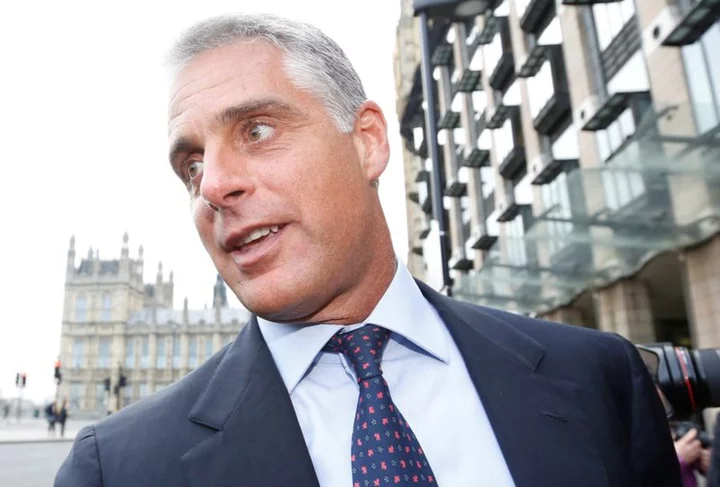By Valentina Za
MILAN UniCredit Chief Executive Andrea Orcel struck a defiant tone when his bank recently topped profit forecasts for an 11th consecutive quarter.
Investors who trusted the former Merrill Lynch and UBS banker and bought UniCredit's shares on his arrival in April 2021 are so far sitting on a 190% return. They have also pocketed 9 billion euros in buybacks and, to a lesser extent, dividends, with at least another 6.5 billion to come.
"Hopefully, we will continue to deliver...and cost the non-believers a lot of money," Orcel, 60, said as he bid analysts farewell for another quarter.
However, his aspirations to make UniCredit the "bank of Europe" are proving trickier to realise with the CEO setting a high bar for mergers and acquisitions in the euro zone's fractured capital markets, despite having what he describes as the biggest war chest among European lenders.
After boosting profit with minimum capital deployment, using the cash to repurchase UniCredit stock and deliver the outsized returns, Orcel is now in a position to consider bolder moves such as a transformative merger.
"He's probably going to be the chief consolidator of European banking," said Cole Smead, CEO of Arizona-based Smead Capital Management, whose UniCredit holding accounts for more than 7% of its $105 million International Value Fund.
Three decades in investment banking advising on some of Europe's biggest banking deals place Orcel in a privileged position to pursue a merger, and he has made no secret of his view that the sector needs to consolidate.
But while he is ready to pounce, Orcel says any deal must provide an industrial fit and boost earnings per share sufficiently to safeguard investor rewards.
To that end, he wants at least a 15-20% return on the investment, a person close to the matter said, without providing a timeframe.
ALPHA
Orcel made his first international foray last month, after snubbing the chance to take over state-owned Monte dei Paschi di Siena in 2021 and with plans to move on Banco BPM in 2022 derailed by a leak and the Ukraine war. UniCredit bought Greece's 9% stake in Alpha Bank and struck a commercial partnership with the Athens-based lender, also acquiring most of its Romanian operations.
"The Alpha deal makes perfect sense in the framework Orcel has laid out for investors," Smead said. "He bought a 10% return on equity, similar to UniCredit's, at roughly half the value of the book, that is for a cheaper price than his own bank. That's brilliant." he said.
By buying back shares and cancelling them, Orcel has boosted UniCredit's price-to-book value, a key valuation metric, to nearly 70% from 30%, gaining a strong currency in potential merger deals paid for, in full or in part, in shares.
Commerzbank, for example, trades at 40% of its book value. The German lender, in which the state owns more than 15%, has long been seen as a potential partner for UniCredit, which is already present in the country through HVB.
Past interest in a deal has met political resistance from Berlin, however, and it remains to be seen whether Orcel can pull off a bigger acquisition than the Alpha one.
The CEO works closely with a small M&A team he set up within UniCredit which constantly reviews potential deals in the markets and businesses where the bank operates, people with knowledge of the matter said.
But uneven regulation across the euro zone, where progress towards a single banking market has stalled, complicates cross-border deals.
UNFIT FOR PURPOSE
Orcel has denounced Europe's capital markets as "not fit for purpose", saying lenders need a banking union to compete with larger U.S. rivals and adequately finance the region's economy - comments echoed last week by the head of Italy's biggest bank Intesa Sanpaolo.
Given the tight bank-sovereign nexus, Italian lenders' ambitions to expand abroad also have to contend with Italy's debt load, second only to Greece's at 1.4 times domestic output and rated near the bottom of the investment-grade scale.
Orcel, who says he cannot "just sit on idle cash", has pledged to propose extraordinary share buybacks next year if he doesn't find better ways to spend UniCredit's more than 10 billion euros in excess equity.
Calling on Europe to follow his lead, Orcel says he has unlocked UniCredit's potential by giving it a unified strategy across its 13 markets.
While maintaining predecessor Jean-Pierre Mustier's ruthless cost discipline, he has reversed his centralised approach to decision making, hiring thousands of customer-facing staff for the bank's strained branch network and increasing, for example, their loan approval powers.
His focus on growing net fees and reducing reliance on lending income has boosted UniCredit's advisory and capital markets business and seen the rebuilding of in-house fund management skills lost when Mustier sold asset manager Pioneer.
"He revitalised the bank: earnings are just impressive, it really generates a lot of cash, and it's been one buyback after the other," said Carlo Franchini, who runs the proprietary desk of private bank Banca Ifigest in Milan.
"UniCredit can certainly be a consolidator in the industry."
Still, analysts warn that investors in the sector remain wary, evidenced by the discount at which European banks trade to their U.S. peers and the wider market, despite a string of earnings upgrades as higher interest rates lift profits.
In UniCredit's case, the high number of funds, many with speculative-type investments in the company, may only be waiting for an excuse to cash in on the share price rise, they said.
(Additional reporting by Danilo Masoni; Editing by Kirsten Donovan)

